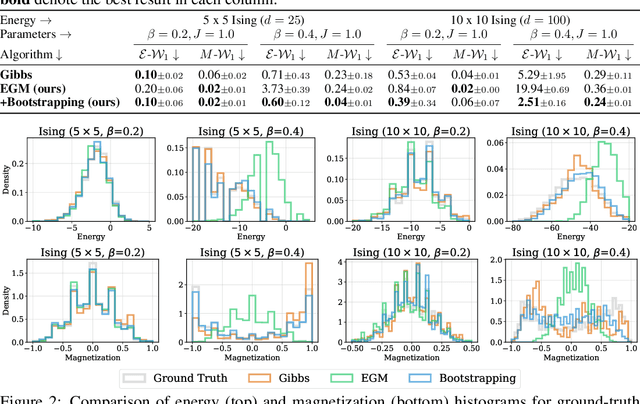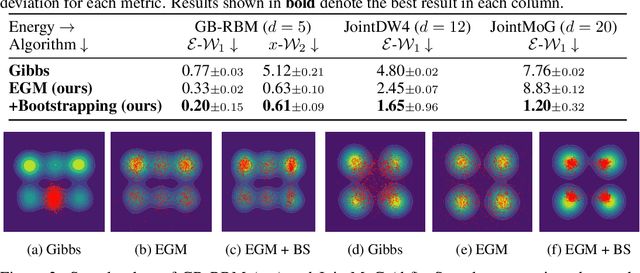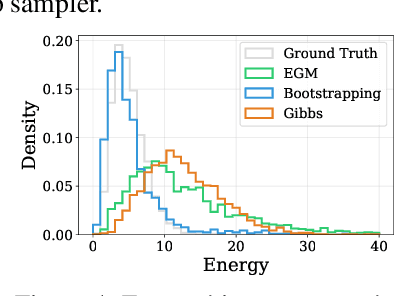Dongyeop Woo
Energy-based generator matching: A neural sampler for general state space
May 26, 2025



Abstract:We propose Energy-based generator matching (EGM), a modality-agnostic approach to train generative models from energy functions in the absence of data. Extending the recently proposed generator matching, EGM enables training of arbitrary continuous-time Markov processes, e.g., diffusion, flow, and jump, and can generate data from continuous, discrete, and a mixture of two modalities. To this end, we propose estimating the generator matching loss using self-normalized importance sampling with an additional bootstrapping trick to reduce variance in the importance weight. We validate EGM on both discrete and multimodal tasks up to 100 and 20 dimensions, respectively.
On scalable and efficient training of diffusion samplers
May 26, 2025Abstract:We address the challenge of training diffusion models to sample from unnormalized energy distributions in the absence of data, the so-called diffusion samplers. Although these approaches have shown promise, they struggle to scale in more demanding scenarios where energy evaluations are expensive and the sampling space is high-dimensional. To address this limitation, we propose a scalable and sample-efficient framework that properly harmonizes the powerful classical sampling method and the diffusion sampler. Specifically, we utilize Monte Carlo Markov chain (MCMC) samplers with a novelty-based auxiliary energy as a Searcher to collect off-policy samples, using an auxiliary energy function to compensate for exploring modes the diffusion sampler rarely visits. These off-policy samples are then combined with on-policy data to train the diffusion sampler, thereby expanding its coverage of the energy landscape. Furthermore, we identify primacy bias, i.e., the preference of samplers for early experience during training, as the main cause of mode collapse during training, and introduce a periodic re-initialization trick to resolve this issue. Our method significantly improves sample efficiency on standard benchmarks for diffusion samplers and also excels at higher-dimensional problems and real-world molecular conformer generation.
Iterated Energy-based Flow Matching for Sampling from Boltzmann Densities
Aug 29, 2024Abstract:In this work, we consider the problem of training a generator from evaluations of energy functions or unnormalized densities. This is a fundamental problem in probabilistic inference, which is crucial for scientific applications such as learning the 3D coordinate distribution of a molecule. To solve this problem, we propose iterated energy-based flow matching (iEFM), the first off-policy approach to train continuous normalizing flow (CNF) models from unnormalized densities. We introduce the simulation-free energy-based flow matching objective, which trains the model to predict the Monte Carlo estimation of the marginal vector field constructed from known energy functions. Our framework is general and can be extended to variance-exploding (VE) and optimal transport (OT) conditional probability paths. We evaluate iEFM on a two-dimensional Gaussian mixture model (GMM) and an eight-dimensional four-particle double-well potential (DW-4) energy function. Our results demonstrate that iEFM outperforms existing methods, showcasing its potential for efficient and scalable probabilistic modeling in complex high-dimensional systems.
Non-backtracking Graph Neural Networks
Oct 11, 2023Abstract:The celebrated message-passing updates for graph neural networks allow the representation of large-scale graphs with local and computationally tractable updates. However, the local updates suffer from backtracking, i.e., a message flows through the same edge twice and revisits the previously visited node. Since the number of message flows increases exponentially with the number of updates, the redundancy in local updates prevents the graph neural network from accurately recognizing a particular message flow for downstream tasks. In this work, we propose to resolve such a redundancy via the non-backtracking graph neural network (NBA-GNN) that updates a message without incorporating the message from the previously visited node. We further investigate how NBA-GNN alleviates the over-squashing of GNNs, and establish a connection between NBA-GNN and the impressive performance of non-backtracking updates for stochastic block model recovery. We empirically verify the effectiveness of our NBA-GNN on long-range graph benchmark and transductive node classification problems.
 Add to Chrome
Add to Chrome Add to Firefox
Add to Firefox Add to Edge
Add to Edge